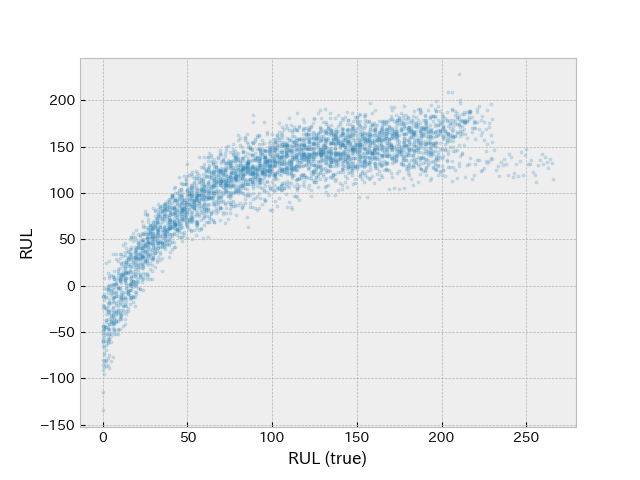c) Feature engineering
Let’s see if linear model can be improved by adding engineered features. Usually we pay more attention to deviations from stable operating conditions. Compute $\phi’$(t) = $\phi$(t) - $\mu(\phi[t_0,t_{19}])$, where $\phi’$ at time step t is derived by subtracting average value of $\phi$ in the first 20 time steps from $\phi$ at time step t. Use both raw and engineered variables for training of linear model.
def feature_engineering(frame):
window = 20
df = frame[frame.unit==1].copy()
stable = df[:window].rolling(window).mean()[-1:]
features = df - stable.to_numpy()
for unit in np.arange(2,101):
df = frame[frame.unit==unit].copy()
stable = df[:window].rolling(window).mean()[-1:]
df = df - stable.to_numpy()
features = pd.concat([features, df])
diffs = ['unit', 'time', 'altitude', 'mach', 'TRA', 'T2_diff', 'T24_diff', 'T30_diff', 'T50_diff', 'P2_diff',
'P15_diff', 'P30_diff', 'Nf_diff', 'Nc_diff', 'epr_diff', 'Ps30_diff', 'phi_diff', 'NRf_diff', 'NRc_diff', 'BPR_diff',
'farB_diff', 'htBleed_diff', 'Nf_dmd_diff', 'PCNfR_dmd_diff', 'W31_diff', 'W32_diff', 'rul']
features.columns = diffs
restore = ['unit', 'time', 'rul', 'altitude', 'mach', 'TRA']
features[restore] = frame[restore]
return features
features = feature_engineering(train)
df_train = pd.merge(train, features, on=['unit', 'time', 'rul', 'altitude', 'mach', 'TRA'])
x_train, x_val, y_train, y_val = get_train_val(df_train)
reg_lin = LinearRegression()
reg_lin.fit(x_train, y_train)
predictions = reg_lin.predict(x_val)
plt.figure()
plt.scatter(y_val, predictions, s=5, alpha=0.2)
plt.xlabel('RUL (true)')
plt.ylabel('RUL')
predictions[predictions < 1] = 1
print('MSE', mean_squared_error(y_val, predictions))
print('R2', r2_score(y_val, predictions))
print('score', custom_loss(y_val, predictions))

Two band structure is not apparent now thanks to feature engineering.
raw feature engineered
================================
MSE 1581.6 1190.8
R2 0.57987 0.68369
score inf inf
Improvements can also be seen in evaluation metrics. RUL prediction has been performed with the simple linear model. Let’s see how more complex models perform with the same data set.
